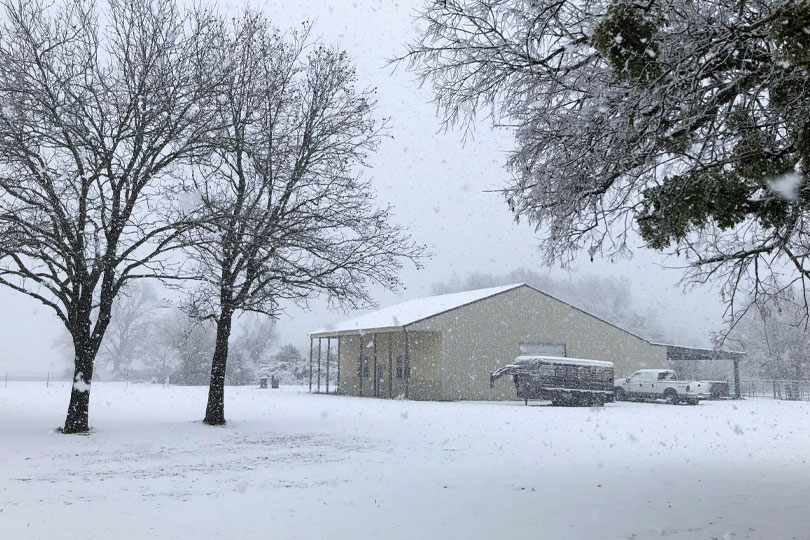By Jennifer Whitlock
Field Editor
After last winter’s massive ice and snowstorm, many Texans purchased portable generators and other necessities to prepare for future weather-related storms or disasters.
Frequently, adverse winter weather is accompanied by power outages, necessitating the use of those portable generators or other heat and power sources.
Carbon monoxide poisoning and house fire-related deaths tend to increase in those times. But those deaths are preventable.
Following the safety tips below can help keep Texans stay safe the next time natural disaster strikes.
Carbon monoxide poisoning
Carbon monoxide (CO), which is colorless and odorless, is produced any time fuel is burned in vehicles, small engines, stoves, lanterns, grills, fireplaces, gas ranges or furnaces.
More than 400 Americans die from CO poisoning not linked to fires annually, over 20,000 visit the emergency room and over 4,000 are hospitalized, according to the U.S. Centers for Disease Control (CDC).
The gas can build up in enclosed spaces, poisoning people and animals who breathe it in by displacing oxygen in the bloodstream. Symptoms of CO poisoning—often described as “flu-like”—include headache, nausea, dizziness, weakness, upset stomach, vomiting, chest pain and confusion.
Heating systems, water heaters and gas, oil or coal-burning appliances are common culprits of CO poisoning. But when natural disasters occur, people frequently turn to portable generators to power heating and other necessary appliances.
The U.S. Consumer Product Safety Commission (CPSC) estimates about 70 Americans die each year from CO poisoning caused by portable generators.
Do not use a portable generator inside a home or garage, even if doors and windows are open. Large amounts of CO can overwhelm individuals in a matter of minutes, causing them to lose consciousness and suffocate before ever recognizing the symptoms.
To mitigate the danger of CO poisoning, the CDC recommends positioning generators more than 20 feet away from homes, doors and windows.
Battery-operated or battery back-up CO detectors can save lives. Check CO detectors routinely to ensure proper function in the event of an emergency. The detectors should be positioned near every sleeping area and on each floor of the home, according to the CPSC.
Other sources of CO poisoning in natural disaster situations include burning charcoal or propane grills indoors or sitting in a running car inside the garage. Never use charcoal or propane grills indoors, and if a vehicle cannot be moved to an open area, do not ever leave it running for any length of time.
House fires
About 2,620 U.S. civilians died in house fires each year from 2015-2019.
While the National Fire Protection Association (NFPA) states nearly half of home structure fires are caused by cooking, 13% of house fires and 18% of deaths during that four-year period were caused by heating equipment.
NFPA advises those using space heaters maintain a three-foot space around furnaces, fireplaces, wood-burning stoves or portable space heaters. Portable heaters and space heaters should be turned off when exiting the room or while sleeping.
Half of home heating equipment fires occur from December to February, and four out of five home heating fire deaths are caused by space heaters, according to NFPA data.
Victims of house fires frequently failed to position space heaters far enough away from flammable materials like upholstered furniture, clothing, mattresses and bedding.
Fireplaces are another major source of home heating fires. NFPA research indicates three in 10 heating equipment fires are caused by fireplaces or chimneys.
People should use fireplaces to heat homes only after the fireplace and chimney have been inspected and cleaned or repaired as necessary by a professional. Improperly maintained fireplaces and chimneys can have dangerous creosote buildup, cracks or other faults that increase the risk of CO poisoning or unconfined fires in surrounding house framing or indoor areas.
Knowing how to operate the flue duct properly is important, as well, since a closed flue may also lead to CO poisoning.
In addition to the danger of CO poisoning, house fires may occur when people attempt to cook indoors using propane or charcoal grills. Never bring a grill rated for outdoor use inside.
Follow safety tips, save lives
Following these tips during cold weather and power outages can save lives. Stay safe no matter the season and keep families protected by always using generators and heat sources responsibly.
More information on CO poisoning is available from CDC.
NFPA also has additional resources on fire causes and risks.

